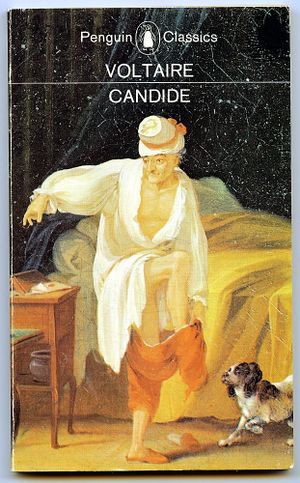Candide (Novel)
The novel Candide, (its original French title is: Candide, ou l'Optimisme), by Voltaire was originally published in 1759 in Paris. It is considered a classic of Western literature, has always been very popular and translated into dozens of languages. Though it is in 30 chapters it is a short novel and can be read in about two hours. However this work has stirred up many controversies. One of the secondary characters in Candide is Jacques, the Anabaptist. Jacques, in some English translations is named "James, the Baptist", is the only righteous character in the novel. All others including the main title character Candide are seriously flawed.
In Candide Voltaire has its title character roam the world. In Chapter 3 Candide is in Holland where he first encounters the kind Jacques who takes Candide to his home and cares for him employing him in his rug factory. Next chapter Candide finds Pangloss his old mentor now very ill and takes him to Jacques who also takes him in and pays a doctor to cure him. Then in chapter 5 all three sail to Lisbon, Portugal. A furious storm overtakes the ship and Jacques lends a needed hand but in return is beaten down by a furious sailor. In hitting Jacques the sailor almost falls overboard. In a gesture of turning the other cheek Jacques saves the sailor. In the rescue Jacques falls overboard, the sailor does nothing to help him and he drowns. Later the ship sinks, and Pangloss, Candide, and the sailor are the only survivors.
In the two hundred years from the Reformation to Voltaire's day the only histories of Anabaptism read by non-Mennonites were by their critics. Thus Voltaire's knowledge of Anabaptism was formed by these works. However, he also observed and no doubt encountered their descendents in the form of Mennonites in Netherlands and Alsace and he was impressed by their tolerance and their simple life of Christian discipleship. Voltaire was undogmatic but the quality of life one leads was of prime importance to him.
Voltaire wrote Candide during the Age of Enlightenment and through this work with satire and picaresque the hero, Candide, embraces the optimistic and hopeful philosophy of his mentor Pangloss that this "is the best of all possible worlds." However, the book and Candide's life are full of all the deadly sins, war, murder, rape, indifference, and catastrophes of illness, earthquake, and deadly storms. In Jacques, the Anabaptist, Voltaire presents a critique of religion for although he is an Anabaptist and thus for the readers a person who has rejected most fundamental tenets of Christianity, infant baptism, dogmas, church institutions, he is the most “Christian” of the characters. Jacques actually practices charity rather than merely talking about it. On the contrary, other Christians are not at all charitable; they threaten and ill treat Candide. Voltaire shows that Candide's optimistic philosophy is unsound and life often defies rational explanation and the ineffectiveness of war, philosophy and organized religion is exposed.
See also Literature, Mennonites in -- Germany, Austria, Switzerland, and France; Literature, Mennonites in -- Netherlands
Bibliography
Epp, Anthony R. :Voltaire and the Anabaptists." in Mennonite Quarterly Review, vol. XLV, no.2, April 1971, pp. 145-151.
Epp, Anthony R. "Treatment of Anabaptists in Eighteenth-Century French Reference Works." in Mennonite Quarterly Review, vol. LX, no.2, April 1986, pp. 165-179.
| Author(s) | Victor G. Wiebe |
|---|---|
| Date Published | December 2017 |
Cite This Article
MLA style
Wiebe, Victor G.. "Candide (Novel)." Global Anabaptist Mennonite Encyclopedia Online. December 2017. Web. 16 Apr 2024. https://gameo.org/index.php?title=Candide_(Novel)&oldid=155977.
APA style
Wiebe, Victor G.. (December 2017). Candide (Novel). Global Anabaptist Mennonite Encyclopedia Online. Retrieved 16 April 2024, from https://gameo.org/index.php?title=Candide_(Novel)&oldid=155977.
©1996-2024 by the Global Anabaptist Mennonite Encyclopedia Online. All rights reserved.
